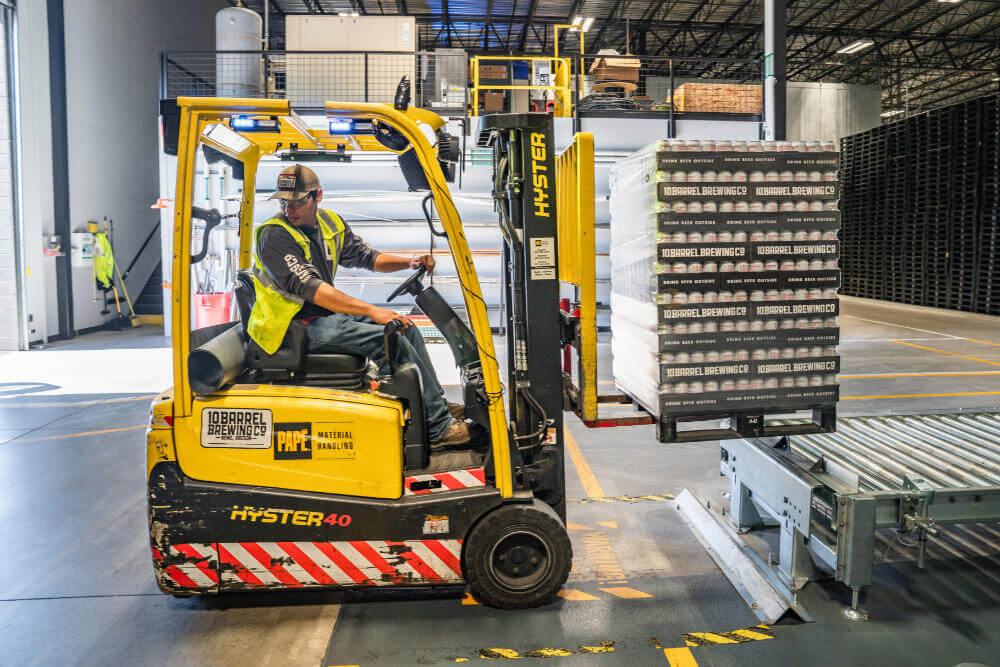Find the right picking method for you!
Picking or picking is generally defined by (a) the number of pickers working on an order, (b) the number of stock aisles, and also (c) the frequency with which orders are scheduled per shift.
Picking - optimize your warehouse management with Microsoft Dynamics Supply Chain. It is a revolutionary solution that allows you to accurately track and manage inventory, minimize losses and maximize the efficiency of your supply chain. With advanced analytics tools and intelligent planning, you'll always have an accurate view of your warehouse status and be able to respond quickly and flexibly to demand.
More about Dynamics 365 Supply Chain
And now to the individual methods of picking goods:
1. Pick up after ordering
The advantage of the method is its absolute simplicity, where the Picker processes one order line by line.
The advantage of this method is its simplicity, therefore it is one of the basic and therefore most common types of picking. The picker in this case processes one order line by line. Moreover, only one scheduling window is active during the shift. Thus, orders are not scheduled and can be picked at any time during the day.
This method of picking goods allows the use of a paper list, provides ample time, and makes it easy to monitor the picker's diligence. At the same time, it is the least efficient approach.
2. Zone picking
Pickers are assigned a specific area in which they are responsible for picking all stock units for all orders. If the order requires goods that are also in other zones, the order is picked only after it has passed through all zones. Therefore, this method is also called "pick and pass".
There is only one planning period per shift, which is the latest date for orders to be included in the picking process. Orders received after this deadline are not picked until the following shift.
3. Batch picking
In this method, the picker picks a group of orders, one SKU at a time. This is advantageous when there are multiple orders for one SKU. The picker will then go on the road only once and pick multiple orders.
The main advantage of choosing this method is the shorter transport time, which leads to higher productivity. Batch picking is often used when a typical order has only a few stock keeping units (less than four) and their dimensions are relatively small. As with zone picking, this method requires only one planning window.
4. Cluster picking
Cluster picking involves picking several orders at the same time. Most often, the picker travels around the warehouse with one trolley holding several crates. Each crate equals one order.
There are two main picking systems for which the method is advantageous:
- Unloading into a cart loaded with several crates. The trolley operator goes through the warehouse and sorts the individual orders, avoiding unproductive movement.
- Vertical lifting systems (VLM) or belts using a zone picking technique. The picker will bring in a batch of crates, putting the automated modules into operation and the items are sorted into the crates. This technique is used to optimize individual bags by reducing the number of machine cycles.
5. Wave picking
This picking system is very similar to the stand-alone picking method, with the main difference between the two types being the planning window. There is no such window in stand-alone picking, whereas there is in wave picking. Orders can be scheduled to be picked at specific times during the day, which is usually done to coordinate and maximize shipping operations.
6. Zone-batch picking
It is a combination of the two methods of picking goods mentioned above. Pickers are assigned a zone, but within that zone they also pick goods in batches. And since both zone and batch picking methods have a planning window, zone-batch picking also has a planning window.
7. Zone-wave picking
In this combination of methods, each picker is assigned its own zone in which it picks all orders in the stock units. At any given time, a picker will only pick one order per planning window per shift.
Each picker is assigned a zone within a planning window, the picker will pick one order
8. Zone-batch-wave picking
This is the most complex combination of all order picking methods. The picker is assigned a zone and then picks all stock units for orders in the assigned zone. However, the picker picks more than one stock unit at a given time, within several planning windows per shift.
Indicative overview of goods picked per one picker working hour: unloading a full trailer, sorting on pallets
| Picking type | Number of picks |
| 120 boxes | |
| Stacking full pallets on moving belt | 640 boxes |
| Unloading a full pallet into the Location at pallet rack | 32 pallets |
| Picking items from the drop rack with boxes into bags (using a picking slip) | 184 order lines |
| Retrieving items from the drop rack with boxes (picking by light) | 260 order lines |
| Removal of items from horizontal belts (group of approx. 3 items, using light indicator) into bags | 300 lines of orders |
| Stacking full crates using a forklift; stacking from a pallet rack at floor level onto a pallet | 29 crates |
| Stacking of a full crate using a controlled trolley and stacking from all levels of the pallet rack onto pallets | 134 crates |
| Stacking full crates from a sliding pallet rack onto a moving powered belt (picking tickets) | 525 crates |
| Stacking full crates from a sliding pallet rack onto a moving powered belt (voice recognition) | 600 lines of orders |
| Stacking whole pallets using a counterbalanced trolley from the floor storage area | 50 pallets |
| Stacking of whole pallets using a counterweight trolley from the pallet rack | 65 pallets |


